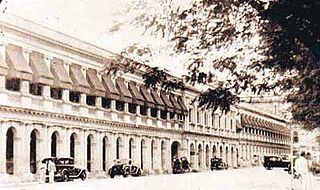
Impeachment is the process by which a legislative body or other legally constituted tribunal initiates charges against a public official for misconduct. It may be understood as a unique process involving both political and legal elements.

The politics of Zimbabwe takes place in a framework of a full presidential republic, whereby the President is the head of state and government as organized by the 2013 Constitution. Executive power is exercised by the government. Legislative power is vested in both the government and parliament. The status of Zimbabwean politics has been thrown into question by a 2017 coup.

A senate is a deliberative assembly, often the upper house or chamber of a bicameral legislature. The name comes from the ancient Roman Senate, so-called as an assembly of the senior and therefore considered wiser and more experienced members of the society or ruling class.

The positions of Majority Leader and Minority Leader are held by two United States senators and members of the party leadership of the United States Senate. They serve as the chief spokespersons for their respective political parties holding the majority and the minority in the United States Senate. They are each elected as majority leader and minority leader by the senators of their party caucuses: the Senate Democratic Caucus and the Senate Republican Conference.

The Parliament of the Republic of South Africa is South Africa's legislature; under the present Constitution of South Africa, the bicameral Parliament comprises a National Assembly and a National Council of Provinces. The current twenty-seventh Parliament was first convened on 22 May 2019.

The Constitution of South Africa is the supreme law of the Republic of South Africa. It provides the legal foundation for the existence of the republic, it sets out the rights and duties of its citizens, and defines the structure of the Government. The current constitution, the country's fifth, was drawn up by the Parliament elected in 1994 in the South African general election, 1994. It was promulgated by President Nelson Mandela on 18 December 1996 and came into effect on 4 February 1997, replacing the Interim Constitution of 1993. The first constitution was enacted by the South Africa Act 1909, the longest-lasting to date. Since 1961, the constitutions have promulgated a republican form of government.

The Senate is the upper house of the Polish parliament, the lower house being the Sejm. The history of the Polish Senate stretches back over 500 years; it was one of the first constituent bodies of a bicameral parliament in Europe and existed without hiatus until the final partition of the Polish state in 1795. The contemporary Senate is composed of 100 senators elected by a universal ballot and is headed by Marshal of the Senate. The incumbent Marshal of the Senate is Tomasz Grodzki.

The Great Council of Chiefs(Bose Levu Vakaturaga in Fijian, ग्रेट काउंसिल ऑफ चीफ्स in Fiji Hindi) was a constitutional body in Fiji from 1876 to March 2012. In April 2007, the council was suspended, due to an unworkable relationship with Frank Bainimarama, leader of an "interim government" that came to power through military coup in December 2006. It was formally disestablished by decree in March 2012.

The National Council of Provinces (NCOP) is the upper house of the Parliament of South Africa under the (post-apartheid) constitution which came into full effect in 1997. It replaced the former Senate, but is very similar to that body, and to many other upper houses of legislatures throughout the world, in that its purpose is to represent the governments of the provinces, rather than directly representing the people.
Fiji is divided administratively into four divisions, which are further subdivided into fourteen provinces. Each province has a provincial council.

The Parliament of Pakistan is the federal and supreme legislative body of Pakistan. It is a bicameral federal legislature that consists of the Senate as the upper house and the National Assembly as the lower house. According to the constitution of the Islamic Republic of Pakistan, the President of Pakistan is also a component of the Parliament. The National Assembly is elected for a five-year term on the basis of adult franchise and one-man one-vote. The tenure of a Member of the National Assembly is for the duration of the house, or sooner, in case the Member dies or resigns. The tenure of the National Assembly also comes to an end if dissolved on the advice of the Prime Minister or by the president in his discretion under the Constitution.

The Speaker of the National Assembly presides over the National Assembly of South Africa, the lower house of the Parliament of South Africa. The speaker is chosen from among the Members of the Assembly at its first sitting following a general election and whenever the office is vacant. The Speaker acts as a "referee", taking charge of debates to make sure that the MPs can participate freely while keeping to the rules. The Speaker also has managerial duties to ensure that Parliament runs smoothly. Each political party in the Assembly elects a chief whip to run its affairs. The presiding officers, the chief whips, and the Leader of Government Business together decide on the programme of work.
The Senate was the upper house of the Parliament of South Africa between 1910 and its abolition from 1 January 1981, and between 1994 and 1997.

The Parliament of Zimbabwe is the bicameral legislature of Zimbabwe composed of the Senate and the National Assembly. The Senate is the upper house, and consists of 80 members, 60 of whom are elected by proportional representation from ten six-member constituencies corresponding to the country's provinces. Of the remaining 20 seats, 18 are reserved for chiefs, and two for people with disabilities. The National Assembly is the lower house, and consists of 270 members. Of these, 210 are elected from single-member constituencies. The remaining 60 seats are reserved for women, and are elected by proportional representation from ten six-member constituencies corresponding to the country's provinces.

The Senate of Zimbabwe is the upper of the two chambers in Zimbabwe's Parliament. It existed from independence in 1980 until 1989, and was re-introduced in November 2005. The other chamber of Parliament is the House of Assembly
A senator for life is a member of the senate or equivalent upper chamber of a legislature who has life tenure. As of 2021, six Italian senators out of 321, two out of the 41 Burundian senators, one Congolese senator out of 109, and all members of the British House of Lords have lifetime tenure. Several South American countries once granted lifetime membership to former presidents but have since abolished the practice.

The Senate was the upper chamber of the parliament of Ceylon established in 1947 by the Soulbury Commission. The Senate was appointed and indirectly elected rather than directly elected. It was housed in the old Legislative Council building in Colombo Fort and met for the first time on 12 November 1947. The Senate was abolished on 2 October 1971 by the eighth amendment to the Soulbury Constitution, prior to the adoption of the new Republican Constitution of Sri Lanka on 22 May 1972. In 2010 there were proposals to reintroduce the Senate.

The Constitution of 1961 was the fundamental law of South Africa for two decades. Under the terms of the constitution South Africa left the Commonwealth and became a republic.
The Coloured vote constitutional crisis, also known as the Coloured vote case, was a constitutional crisis that occurred in the Union of South Africa during the 1950s as the result of an attempt by the Nationalist government to remove Coloured voters in the Union's Cape Province from the common voters' rolls. It developed into a dispute between the judiciary and the other branches of government over the power of Parliament to amend an entrenched clause in the South Africa Act and the power of the Appellate Division to overturn the amendment as unconstitutional. The crisis ended when the government enlarged the Senate and altered its method of election, allowing the amendment to be successfully enacted.

The 27th South African Parliament is the sixth Parliament of South Africa to convene since the introduction of non-racial government in South Africa in 1994. It was elected in the general election of 8 May 2019 and consists of the National Assembly and the National Council of Provinces. The National Assembly contains 400 members, while the National Council of Provinces contains 90 members. It was formally opened by President Ramaphosa's State of the Nation Address in a joint sitting on 20 June 2019.


























